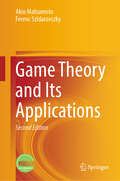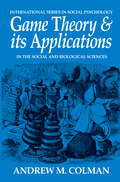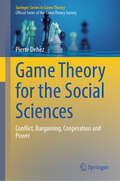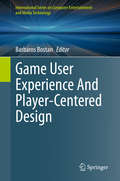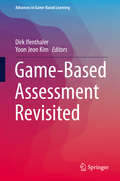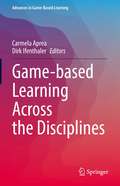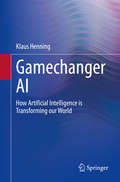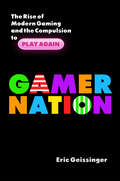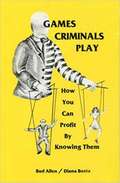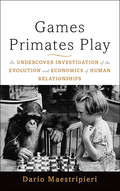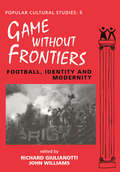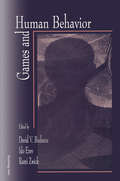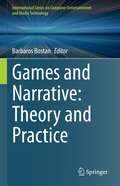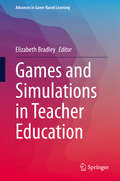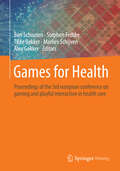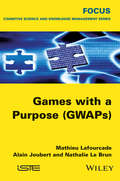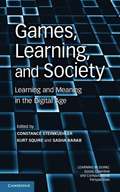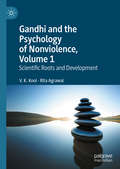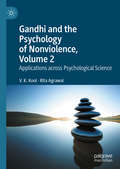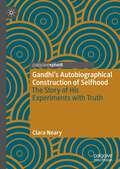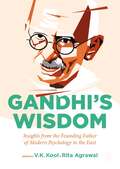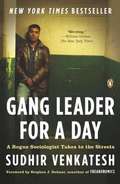- Table View
- List View
Game Theory and Its Applications
by Ferenc Szidarovszky Akio MatsumotoThis book integrates the fundamentals, methodology, and major application fields of noncooperative and cooperative games including conflict resolution. The topics addressed in the book are discrete and continuous games including games represented by finite trees; matrix and bimatrix games as well as oligopolies; cooperative solution concepts; games under uncertainty; dynamic games; and conflict resolution. The methodology is illustrated by carefully chosen examples and applications, and the case studies are selected from economics, social sciences, engineering, the military, and homeland security. This book is highly recommended to readers who are interested in the in-depth and up-to-date integration of the theory and ever-expanding application areas of game theory. Dynamic games with and without delays and partial cooperation are added in the 2nd edition.
Game Theory and its Applications: In the Social and Biological Sciences
by Andrew M. ColmanAndrew Coleman provides an accessible introduction to the fundamentals of mathematical gaming and other major applications in social psychology, decision theory, economics, politics, evolutionary biology, philosophy, operational research and sociology.
Game Theory and its Applications: In the Social and Biological Sciences (International Series In Social Psychology Ser.)
by Andrew M. ColmanAndrew Coleman provides an accessible introduction to the fundamentals of mathematical gaming and other major applications in social psychology, decision theory, economics, politics, evolutionary biology, philosophy, operational research and sociology.
Game Theory for the Social Sciences: Conflict, Bargaining, Cooperation and Power (Springer Series in Game Theory)
by Pierre DehezThis textbook introduces fundamental concepts of game theory and demonstrates its uses and application in the social sciences. Written in plain English and without overwhelming mathematical jargon, it serves as an invaluable resource for undergraduate students in economics, law, political sciences, and related social sciences. Starting from non-cooperative games and progressing to cooperative games, it explores a wide range of topics, including the analysis of zero-sum games, voting rules and their practical implications, and other applications of game theory. Uniquely, it emphasizes cooperative concepts and their normative applications, providing a fresh perspective. With "Game Theory for the Social Sciences", readers will be equipped with the analytical tools to analyze conflict resolution, bargaining strategies, cooperative decision-making, and the dynamics of power relationships. Through engaging examples drawn from real-world scenarios, readers will develop a solid understanding of how game theory can be applied to diverse fields in social sciences. “Pierre Dehez offers a consistent kit of classic game theoretic tools, from equilibrium concepts to bargaining solutions and power indices, all illustrated with insightful examples and applications.” Françoise Forges, Professor of Economics, Université Paris Dauphine-PSL “This book is written clearly and pedagogically without resorting to difficult mathematics. It provides many different and interesting examples from problems of fair sharing, bargaining to voting systems and many others. It is a perfect introduction to this subject too often quoted but too often misunderstood.” Alan Kirman, Directeur d’études, Ecole des Hautes Etudes en Sciences Sociales, Paris, and Emeritus Professor, Aix-Marseille University
Game User Experience And Player-Centered Design (International Series on Computer Entertainment and Media Technology)
by Barbaros BostanThis book provides an introduction and overview of the rapidly evolving topic of game user experience, presenting the new perspectives employed by researchers and the industry, and highlighting the recent empirical findings that illustrate the nature of it. The first section deals with cognition and player psychology, the second section includes new research on modeling and measuring player experience, the third section focuses on the impact of game user experience on game design processes and game development cycles, the fourth section presents player experience case studies on contemporary computer games, and the final section demonstrates the evolution of game user experience in the new era of VR and AR.The book is suitable for students and professionals with different disciplinary backgrounds such as computer science, game design, software engineering, psychology, interactive media, and many others.
Game-Based Assessment Revisited (Advances in Game-Based Learning)
by Dirk Ifenthaler Yoon Jeon KimThe capabilities and possibilities of emerging game-based learning technologies bring about a new perspective of learning and instruction. This, in turn, necessitates alternative ways to assess the kinds of learning that are taking place in the game-based environments. The field has been broadening the focus of assessment in game environments (i.e., what we measure), developing processes and methodologies that go beyond psychometrics practices (i.e., how we go about assessment in games), and implementing the game-based assessment (GBA) in real contexts. The current state of the field calls for a revisit of this topic to understand what we have learned from the research on this topic, and how the GBA work changed how the field thinks about assessment beyond game environments. Accordingly, this comprehensive volume covers the current state of research, methodology, and technology of game-based assessment. It features four major themes: what we are measuring in games, how GBA has influenced how people do assessment beyond games, new methods and practices, and implementations of GBA. The audience for this volume includes researchers, graduate students, teachers, and professional practitioners in the areas of education, instructional design, educational psychology, academic and organizational development, and instructional technology.
Game-based Learning Across the Disciplines (Advances in Game-Based Learning)
by Dirk Ifenthaler Carmela ApreaThe volume focuses on epistemological, theoretical and empirical issues of game-based learning in various disciplines. It encompasses questions of game design as well as instructional integration and organizational implementation of game-based learning across various disciplines and includes contributions from different levels of the formal educational system (i.e., primary, secondary and tertiary education) as well as contributions reporting the use of game-based learning in informal learning settings. The volume addresses scholars, practitioners and students who are interested in how games and game-based learning can be designed, implemented and evaluated in a cross-, inter- and transdisciplinary perspective.
Gamechanger AI: How Artificial Intelligence is Transforming our World
by Klaus HenningArtificial intelligence changes everything. This book encourages readers to consider the challenges of the digital transformation driven by Artificial Intelligence. The reader will discover why this transformation is to be regarded as the greatest cultural revolution since the invention of mass printing and how it can be shaped positively in a value-oriented way. The author pursues the thesis that intelligent objects on the internet, as well as physical objects, are attaining their own consciousness. Using many examples, he shows how these digital companions become our digital partners. This non-fiction book provides many suggestions for one's own living and working environment and is full of examples of how artificial intelligence systems can be implemented. The reader learns what is already possible today and what can be expected in the next ten to twenty years. The book is of interest to anyone interested in AI and the digital transformation - from those responsible in companies, public institutions, and in politics, to all teachers and parents who want to understand what the next generation can expect.
Gamer Nation: The Rise of Modern Gaming and the Compulsion to Play Again
by Eric GeissingerA tech-industry insider takes a critical look at the effect games are having on our short- and long-term happiness and assesses the cultural prospects of a society increasingly obsessed with gaming.The American "game economy" has become an enormous enterprise, devouring roughly one-ninth of America's entire economic output. This overview of arguably the most influential segment of the entertainment industry examines the perspectives of gaming enthusiasts, addicts, designers, arcade owners, psychologists, philosophers, and more. Weighing the positive and negative aspects of games, the author considers their effect not only upon the players but upon culture and society. What trade-offs are being made when people play games for twenty-plus hours a week? The author puts particular emphasis on Candy Crush, whose enormous popularity has left all other games far behind. Since 2013 it has been installed over a billion times and its simplicity has disrupted previous game-design assumptions, proving new games don't have to be sophisticated and graphically immersive. He also offers insights from interviews with experts on the mechanics of manipulation. Sophisticated psychological tools are used to design games that are compelling, irresistible, and possibly addicting. In a few case, obsessive game-playing has been the cause of death. Whether you enjoy games as a harmless pastime or are suspicious of their effects on the quality of your family's life, you'll want to read this wide-ranching exploration of the growing game phenomenon.
Games Alcoholics Play
by Claude M. SteinerThe most lucid account of the patterns of problem drinkers ever set down in a book!Drawing on soundly tested theories of transactional behavior, Dr. Steiner describes the three distinct types of alcoholics -- Drunk and Proud, Lush and Wino -- and their games, scripts and rackets: Debtor... Kick... Cops and robbers... Plastic Woman... Captain Marvel...Ain't it awful... Schlemiel... Look how hard I've tried... and others.His approach is the single most useful tool for dealing with alcoholism since A.A. and the Twelve Steps, and offers the first real help -- and hope -- for problem drinkers and their families.From the Paperback edition.
Games Criminals Play: How You Can Profit by Knowing Them
by Bud Allen Diana Bosta"These puppets have been: doctors, attorneys, policemen, psychologists, teachers, clergymen, and John Q. Public. Have you ever done anything you didn't really want to do? Have you ever had that 'gut-level feeling' that something was wrong but couldn't put your finger on it? These games are perfected in prison, but are games everyone should know. Here - for the first time, is a book that - For correctional employees, provides one of the most effective tools for the behavior control of prisoners. For the public, exposes the scam or fraud and teaches how to recognize and prevent the processes criminals apply in society. This is a non-technical book that anyone can understand and use in his or her daily life. "Games Criminal Play, and How You Can Profit By Knowing Them" is a very important book. Almost daily one reads in the newspapers of various scams perpetrated on the American public. It is a unique book; no one else has revealed before this, the anatomy or structure, of set-ups, or criminals' plots. The cases in this book are not only informative, but intensely interesting"--Unedited summary from book cover.
Games People Play: The Psychology of Human Relationships
by Eric BernePeople tend to live their lives by consistently playing out certain 'games' in their interpersonal relationships, for a variety of reasons. If not destructive, these games are desirable and necessary.
Games Primates Play: An Undercover Investigation of the Evolution and Economics of Human Relationships
by Dario MaestripieriMost humans don’t realize that when they exchange emails with someone, anyone, they are actually exhibiting certain unspoken rules about dominance and hierarchy. The same rules regulate the exchange of grooming behavior in rhesus macaques or chimpanzees. Interestingly, some of the major aspects of human nature have profound commonalities with our ape ancestors: the violence of war, the intensity of love, the need to live together. While we often assume that our behavior in everyday situations reflects our unique personalities, the choices we freely make, or the influences of our environment, we rarely consider that others behave in these situations in almost the exact the same way as we do. In Games Primates Play, primatologist Dario Maestripieri examines the curious unspoken customs that govern our behavior. These patterns and customs appear to be motivated by free will, yet they are so similar from person to person, and across species, that they reveal much more than our selected choices. Games Primates Play uncovers our evolutionary legacy: the subtle codes that govern our behavior are the result of millions of years of evolution, predating the emergence of modern humans. To understand the rules that govern primate games and our social interactions, Maestripieri arms readers with knowledge of the scientific principles that ethologists, psychologists, economists, and other behavioral scientists have discovered in their quest to unravel the complexities of behavior. As he realizes, everything from how we write emails to how we make love is determined by the legacy of our primate roots and the conditions that existed so long ago. An idiosyncratic and witty approach to our deep and complex origins, Games Primates Play reveals the ways in which our primate nature drives so much of our lives.
Games Without Frontiers: Football, Identity and Modernity (Popular Cultural Studies)
by John WilliamsWhat is the historical appeal of football? How diverse are its players, supporters and institutions throughout the world? What are its various traditions and how are these affected by pressures to modernize ? In what ways does the game help to reinforce or overcome social differences and prejudices? How can we understand football’s subcultures, especially football hooligan ones? The 1994 World Cup Finals in the United States have again demonstrated the conflicts which exist around football over its international future. The multi-media age beckons new audiences for top-level matches, but worries remain that the historical and cultural appeal of football itself may be the real loser. The global game has a breadth of skills, playing techniques, supporting styles and ruling bodies. These are all subject to local and national traditions of team play and fan display. Modern commercial influences and international cultural links through players and fan styles, are accommodated within the game to an increasing extent. Yet, football’s ability to differentiate remains: at local, regional, national and even continental levels. In some cases the game’s traditions ensure that these differences are becoming as oppositional today as is modern football hooliganism. But, the overall picture is one of a game without frontiers - rich in historical and cultural detail, pluralistic in its traditions and identities. This volume brings together essays by leading academics and researchers writing on world football. Their studies draw on interdisciplinary researches in England, Scotland, France, Italy, Germany, Austria, Argentina and Australia. The book will be of interest to students of sports science, cultural studies and social science and to all those who simply enjoy football as the world's greatest sporting passion.
Games and Human Behavior: Essays in Honor of Amnon Rapoport
by Ido Erev Rami Zwick David V. BudesenHuman behavior often violates the predictions of rational choice theory. This realization has caused many social psychologists and experimental economists to attempt to develop an experimentally-based variant of game theory as an alternative descriptive model. The impetus for this book is the interest in the development of such a theory that combines elements from both disciplines and appeals to both. The editors have brought together leading researchers in the fields of experimental economics, behavioral game theory, and social dilemmas to engage in constructive dialogue across disciplinary boundaries. This book offers a comprehensive overview of the new insights into the motivation of human behavior under a variety of naturally or artificially induced incentive structures that are emerging from their work. Amnon Rapoport--a pioneer and leader in experimental study and quantitative modeling of human decisions in social and interactive contexts--is honored.
Games and Narrative: Theory and Practice (International Series on Computer Entertainment and Media Technology)
by Barbaros BostanThis book provides an introduction and overview of the rapidly evolving topic of game narratives, presenting the new perspectives employed by researchers and the industry, highlighting the recent empirical findings that illustrate the nature of it. The first section deals with narrative design and theory, the second section includes social and cultural studies on game narrative, the third section focuses on new technologies and approaches for the topic, the fourth section presents practices and case studies, and the final section provides industry cases from professionals.
Games and Simulations in Teacher Education (Advances in Game-Based Learning)
by Elizabeth BradleyThis book includes more than twenty computer games and simulations for use in teacher training. Each of these simulations is innovative and presents an opportunity for pre-service teachers to have hands-on experience in an area of need prior to teaching in the classroom. Information on the simulation origins, including theoretical underpinnings, goals, characteristics, relevant research/program evaluation results, discussion of benefits and limitations as well as dissemination, recommended use, scope of practice, etc. of each game or simulation are included. Pre-service and new teachers will gain a number of useful skills through completion of these simulations and higher education faculty and administrators will gain a plethora of research-based and effective training tools for use in their teacher training programs.
Games for Health
by Ben Schouten Stephen Fedtke Tilde Bekker Marlies Schijven Alex GekkerFounded in 2004, the Games for Health Project supports community, knowledge and business development efforts to use cutting-edge games and game technologies to improve health and health care. The Games for Health Conference brings together researchers, medical professionals and game developers to share information about the impact of games, playful interaction and game technologies on health, health care and policy. Over two days, more than 400 attendees participate in over 60 sessions provided by an international array of 80+ speakers, cutting across a wide range of activities in health and health care. Topics include exergaming, physical therapy, disease management, health behavior change, biofeedback, rehab, epidemiology, training, cognitive health, nutrition and health education.
Games with a Purpose (GWAPS)
by Mathieu Lafourcade Nathalie Le Brun Alain JoubertHuman brains can be seen as knowledge processors in a distributed system. Each of them can achieve, conscious or not, a small part of a treatment too important to be done by one. These are also "hunter / gatherers" of knowledge. Provided that the number of contributors is large enough, the results are usually better quality than if they were the result of the activity of a single person, even if it is a domain expert. This type of activity is done via online games.
Games, Learning, and Society
by Sasha Barab Kurt Squire Constance SteinkuehlerThis volume is the first reader on video games and learning of its kind. Covering game design, game culture and games as twenty-first-century pedagogy, it demonstrates the depth and breadth of scholarship on games and learning to date. The chapters represent some of the most influential thinkers, designers and writers in the emerging field of games and learning - including James Paul Gee, Soren Johnson, Eric Klopfer, Colleen Macklin, Thomas Malaby, Bonnie Nardi, David Sirlin and others. Together, their work functions both as an excellent introduction to the field of games and learning and as a powerful argument for the use of games in formal and informal learning environments in a digital age.
Gandhi and the Psychology of Nonviolence, Volume 1: Scientific Roots and Development
by Rita Agrawal V. K. KoolThe first of two volumes, this book examines Gandhi’s contribution to an understanding of the scientific and evolutionary basis of the psychology of nonviolence, through the lens of contemporary researches on human cognition, empathy, morality and self-control.While, psychological science has focused on those participants that delivered electric shocks in Professor Stanley Milgram’s famous experiments, these books begin from the premise that we have neglected to fully explore why the other participants walked away. Building on emergent research in the psychology of self control and wisdom, the authors illustrate what Gandhi’s life and work offers to our understanding of these subjects who disobeyed and defied Milgram.The authors analyze Gandhi’s actions and philosophy, as well as original interviews with his contemporaries, to elaborate a modern scientific psychology of nonviolence from the principles he enunciated and which were followed so successfully in his Satyagrahas. Gandhi, they argue, was a practical psychologist from whom we can derive a science of nonviolence which, as Volume 2 will illustrate, can be applied to almost every subfield of psychology, but particularly to those addressing the most urgent issues of the 21st century. This book is the result of four decades of collaborative work between the authors. It marks a unique contribution to studies of both Gandhi and the current trends in psychological research that will appeal in particular to scholars of social change, peace studies and peace psychology, and, serve as an exemplar in teaching one of modern psychology’s hitherto neglected perspectives.
Gandhi and the Psychology of Nonviolence, Volume 2: Applications across Psychological Science
by Rita Agrawal V. K. KoolIn volume 1 of Gandhi and the Psychology of Nonviolence the authors advanced a scientific psychology of nonviolence, derived from principles enunciated by Gandhi and supported by current state-of-the-art research in psychology. In this second volume the authors demonstrate its potential contribution across a wide range of applied psychology fields. As we enter the era of the Anthropocene, they argue, it is imperative to make use of Gandhi’s legacy through our evolving noospheric consciousness to address the urgent problems of the 21st century. The authors examine Gandhi’s contributions in the context of both established areas such as the psychology of religion, educational, community and organizational psychology and newer fields including environmental psychology and the psychology of technology. They provide a nuanced analysis which engages with both the latest research and the practical implications for initiatives like the Intergovernmental Panel on Climate Change and the UN’s Sustainable Development Goals.The book concludes with an overview of Gandhi’s contribution to modern psychology, which encompasses the history, development, and current impetus behind emerging work in the field as a whole. It marks an exciting contribution to studies of both Gandhi and psychology that will also provide unique insights for scholars of applied psychology, education, environmental and development studies.
Gandhi’s Autobiographical Construction of Selfhood: The Story of His Experiments with Truth
by Clara NearyThis book addresses the topics of autobiography, self-representation and status as a writer in Mahatma Gandhi's autobiographical work The Story of My Experiments with Truth (1927, 1929). Gandhi remains an elusive figure, despite the volumes of literature written on him in the seven decades since his assassination. Scholars and biographers alike agree that “no work on his life has portrayed him in totality” (Desai, 2009), and, although “arguably the most popular figure of the first half of the twentieth century” and “one of the most eminent luminaries of our time,” Gandhi the individual remains “as much an enigma as a person of endless fascination” (Murrell, 2008). Yet there has been relatively little scholarly engagement with Gandhi’s autobiography, and published output has largely been concerned with mining the text for its biographical details, with little concern for how Gandhi represents himself. The author addresses this gap in the literature, while also considering Gandhi as a writer. This book provides a close reading of the linguistic structure of the text with particular focus upon Gandhi’s self-representation, drawing on a cognitive stylistic framework for analysing linguistic representations of selfhood (Emmott 2002). It will be of interest to stylisticians, cognitive linguists, discourse analysts, and scholars in related fields such as Indian literature and postcolonial studies.
Gandhi’s Wisdom: Insights from the Founding Father of Modern Psychology in the East
by V. K. Kool Rita AgrawalThis book examines what Gandhian thought contributes to the conceptualisation of wisdom and its application in the 21st Century. It draws together leading international researchers and practitioners to combine an in-depth understanding of Gandhi’s philosophy with the latest research from psychology and allied social sciences. Beginning with an overview of wisdom in the domain of scientific research and as it is understood in our everyday life, the book’s editors further call attention to key cross cultural issues limiting its current scope. Amongst the topics explored are Gandhi’s silence, fasting, vows, self-efficacy, self-control, and more, illustrating what he offers not only to the study of wisdom within psychology, but across a broad range of disciplines and professional enterprises. It is invaluable to students and scholars of Gandhian studies, the psychology of wisdom, management and peace psychology; as well to readers with a general interest in the application of Gandhi’s wisdom today.
Gang Leader for a Day
by Sudhir VenkateshA New York Times BestsellerForeword by Stephen J. Dubner, coauthor of FreakonomicsWhen first-year graduate student Sudhir Venkatesh walked into an abandoned building in one of Chicago's most notorious housing projects, he hoped to find a few people willing to take a multiple-choice survey on urban poverty--and impress his professors with his boldness. He never imagined that as a result of this assignment he would befriend a gang leader named JT and spend the better part of a decade embedded inside the projects under JT's protection. From a privileged position of unprecedented access, Venkatesh observed JT and the rest of his gang as they operated their crack-selling business, made peace with their neighbors, evaded the law, and rose up or fell within the ranks of the gang's complex hierarchical structure. Examining the morally ambiguous, highly intricate, and often corrupt struggle to survive in an urban war zone, Gang Leader for a Day also tells the story of the complicated friendship that develops between Venkatesh and JT--two young and ambitious men a universe apart."Riveting." --The New York Times"Compelling... dramatic... Venkatesh gives readers a window into a way of life that few Americans understand." --Newsweek"An eye-opening account into an underserved city within the city." --Chicago Tribune"The achievement of Gang Leader for a Day is to give the dry statistics a raw, beating heart." --The Boston Globe"A rich portrait of the urban poor, drawn not from statistics but from viivd tales of their lives and his, and how they intertwined." --The Economist"A sensative, sympathetic, unpatronizing portrayal of lives that are ususally ignored or lumped into ill-defined stereotype." --Finanical TimesSudhir Venkatesh's latest book Floating City: A Rogue Sociologist Lost and Found in New York's Underground Economy--a memoir of sociological investigation revealing the true face of America's most diverse city--was published in September 2013 by The Penguin Press
